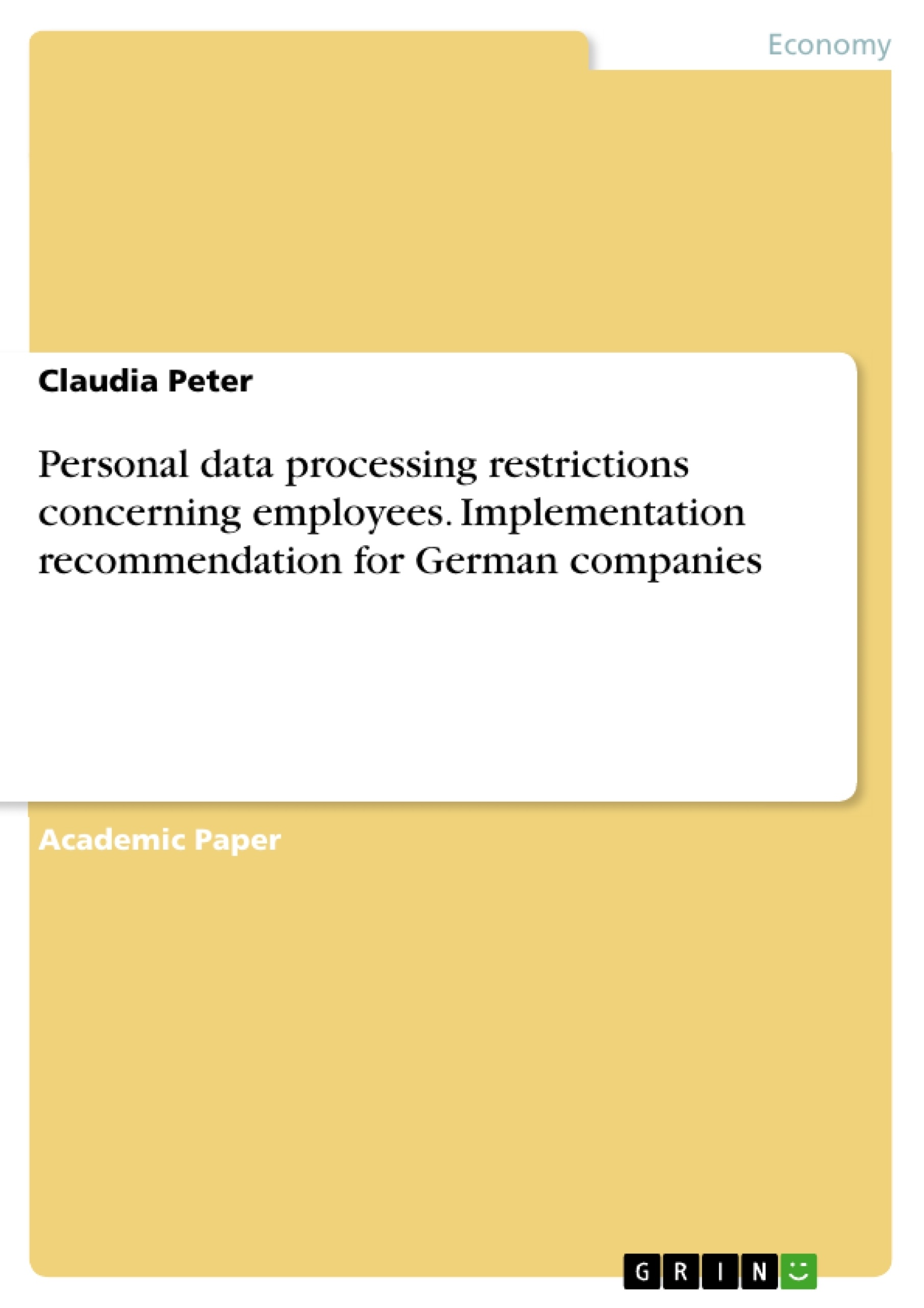This paper poses the following questions: What do companies have to consider to act compliant to GDPR? And which restrictions apply to companies in context with employee data processing? The objective of this paper is to find answers to these questions and to derive appropriate recommendations for action to support German companies in implementing appropriate measures for GDPR compliance. Companies need to collect and process personal data about their employees over the whole employee life cycle, from recruiting, over development until exit of employees. Consequently, companies are affected by the European Union’s General Data Protection Regulation (GDPR), which came into effect on the 25th of May 2018.
It regulates the processing of personal data by a company, an organization or an individual related to natural persons, also called data subjects. As in companies, the human resource department is involved in the whole employee journey, they play a major role as an entity which controls and processes personal data. Therefore, the implementation of appropriate measures to comply with the GDPR as laid out in this paper is essential for all companies who employ people. In the course of the advancing digitization, companies depend more and more on data and face several challenges, ranging from a frequently changing workforce, to ever-changing regulations to the unexpected pandemic with a shift of the way of working with employees and the enforcement to re-think the way employees are managed.
According to Statista, Germany has the second highest aggregated value of GDPR fines imposed in Europe between May 2018 and January 2021 with 69 million euro. Only Italy registered 300.000 euro more fines during that period. No deviation between the kind of data breaches, whether related to customers or to employees could be identified. The author assumes there are employee data breaches included, especially in cases when employees are not satisfied with the company anymore or when they got fired. Fines resulting from non-compliance with GDPR are set at 20 million euro or up to 4 per cent of the annual total income of the preceding financial year, whichever is higher.
Inhaltsverzeichnis (Table of Contents)
- Introduction
- Problem and objectives
- Methodology and structure
- Basic Definitions
- Personal data
- Processing
- Restriction of processing
- Controller
- Processor
- Analysis of data processing restrictions concerning employees
- Personal data protection rights of a natural person
- Obligations of personal data controllers and processors
- Personal data processing restrictions during the employee life cycle
- Restrictions in recruiting activities
- Restrictions during employment and performance measurement
- Restrictions after termination of employment
- Compliance implementation recommendation for German companies
- Conclusion and Outlook
Zielsetzung und Themenschwerpunkte (Objectives and Key Themes)
This paper aims to analyze the restrictions on personal data processing concerning employees in German companies, specifically focusing on the implementation of the European Union's General Data Protection Regulation (GDPR). It examines the challenges companies face in managing employee data, especially in the context of digitalization, evolving regulations, and remote work. The paper also explores the potential risks and consequences of non-compliance with the GDPR.
- Personal data processing restrictions according to GDPR
- The role of the human resources department in data protection
- Challenges of compliance with GDPR in the digital workplace
- Recommendations for companies to ensure GDPR compliance in employee data processing
- The impact of GDPR on the employee life cycle
Zusammenfassung der Kapitel (Chapter Summaries)
The introduction presents the problem of data processing restrictions concerning employees in German companies and outlines the objectives and structure of the paper. The second chapter defines key terms such as "personal data", "processing", and "controller" to establish a common understanding of the legal framework. Chapter three analyzes the restrictions on personal data processing concerning employees, examining their legal rights and the responsibilities of controllers and processors. It then delves into the specific restrictions that apply at different stages of the employee life cycle, from recruitment to termination of employment. The fourth chapter provides practical recommendations for German companies to ensure GDPR compliance in their employee data processing practices.
Schlüsselwörter (Keywords)
This paper examines the key aspects of GDPR, employee data protection, digitalization, data processing restrictions, compliance, human resources management, and data protection best practices for German companies. The primary focus is on analyzing the legal requirements for processing employee data and identifying practical solutions for ensuring compliance.
Frequently Asked Questions
How does GDPR affect employee data processing?
GDPR applies to the entire employee life cycle, from recruitment and performance measurement to termination of employment, requiring strict compliance in how personal data is handled.
What are the potential fines for non-compliance with GDPR?
Fines can reach up to 20 million euros or 4 per cent of a company's annual global turnover, whichever is higher.
What is the difference between a "controller" and a "processor"?
A controller determines the purposes and means of processing personal data, while a processor processes data on behalf of the controller.
What specific restrictions apply during the recruiting phase?
Companies must limit data collection to what is necessary for the hiring decision and ensure candidates are informed about how their data is used.
How has digitalization challenged data protection in HR?
The shift to remote work, increased data dependency, and a frequently changing workforce make it harder to maintain consistent data security and compliance.
- Citation du texte
- Claudia Peter (Auteur), 2021, Personal data processing restrictions concerning employees. Implementation recommendation for German companies, Munich, GRIN Verlag, https://www.grin.com/document/1168644



